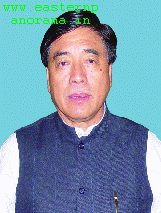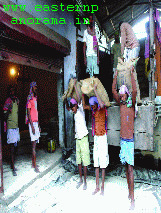Archives
The Great Indian PDS Scam
PDS is operated under the joint responsibility of the Central and the State Governments. The Central Government has taken the responsibility for procurement, storage, transportation and bulk allocation of food grains, etc. The responsibility for distributing the same to the consumers through the network of FPS rests with the State Governments. The operational responsibilities including allocation within the State, identification of families below poverty line, issue of ration cards, supervision and monitoring the functioning of FPSs rest with the State Governments.
 Over the years, PDS have become an important part of Government’s policy for management of food economy in the country. But a recent report of Indian Express reveals that the PDS cases pertain to huge anomalies including forgery and fraud that took place in the PDS in Arunachal between 1995 and 2004 and reveals a glaring lacunae in implementation of the public distribution system and rationing system in the state where the name of the stalwart figure of the state, the former Arunachal Pradesh Chief Minister Gegong Apang has been accused of helping embezzle billions of rupees in public funds while he was in power. His name figures along with a list of 40 accused persons, which the Special Investigation Cell probing the scam submitted to the Gauhati High Court in October 2008.
Over the years, PDS have become an important part of Government’s policy for management of food economy in the country. But a recent report of Indian Express reveals that the PDS cases pertain to huge anomalies including forgery and fraud that took place in the PDS in Arunachal between 1995 and 2004 and reveals a glaring lacunae in implementation of the public distribution system and rationing system in the state where the name of the stalwart figure of the state, the former Arunachal Pradesh Chief Minister Gegong Apang has been accused of helping embezzle billions of rupees in public funds while he was in power. His name figures along with a list of 40 accused persons, which the Special Investigation Cell probing the scam submitted to the Gauhati High Court in October 2008.
PDS a lesson in corruption
As per the sources of Indian Express, the public distribution system (PDS) scandal came to light way back in October 2004 when Bamang Anthony (Tago), President of Arunachal Citizens’ Rights (ACR) and public leader Domin Loya decided to file a PIL in the Gauhati High Court regarding certain anomalies that he had found in the PDS in Arunachal Pradesh, little did he realize that he was actually digging up one of the biggest food scams in the entire subcontinent. Six years later, he is glad his efforts have paid dividends.
Arunachal Pradesh and five other hill states of the North East get two types of reimbursements from the government of India for transportation of food grains under the PDS. While the first is reimbursement of Road Transport Charges (RTC) for lifting of food grains from the nearest railhead of FCI depots to the base depots, the second is called Hill Transport Subsidy (HTS) for moving the stock from the base depots to the approved principal distribution centers.
grains under the PDS. While the first is reimbursement of Road Transport Charges (RTC) for lifting of food grains from the nearest railhead of FCI depots to the base depots, the second is called Hill Transport Subsidy (HTS) for moving the stock from the base depots to the approved principal distribution centers.
Interestingly, even as Bamang Anthony and The Indian Express were only looking at suspected large-scale irregularities in the distribution of food grains in the state, the FCI itself found out, through a special audit, an “excess payment” of Rs 193.53 crore in just one year (2003-04).
The HTS alone for three particular years in which misappropriation was suspected was as follows: Rs 24.27 crore in 2001-02, Rs 75.03 crore in 2002-03, and Rs 279.64 crore in 2003-04.
However, what is even more interesting is that while on one hand the quantity of food grains ‘supplied’ to the people of Arunachal Pradesh under PDS increased (from 54,765 MT in 2001-02 to 85,272 MT) and the reimbursement of HTS also increased, several instances also came to light where the supply records were grossly fraud and fictitious.
One such instance, which The Indian Express highlighted as an illustration of the scam, was the supply of salt under PDS in Damin, a revenue circle in Kurung Kumey district. As per the 2001 census, the circle had a population of 2,784, and records showed that every individual consumed at least 24 kg of iodized salt per month in 2004. Another instance: In Koloriang circle in the same district, roughly 4,800 persons were shown as having consumed 3,080 quintals of rice every month in 2004, which comes to 64 kg per person per month.

Gegong Apang - The Fallen Stalwart
One of the longest serving Chief Minister and veteran Congress leader of Arunachal Pradesh, Gegong Apang was born on July 8, 1949 to parents of Adi descent. He has served as Arunachal Pradesh’s Chief Minister from January 18, 1980 to January 19, 1999 and again from August 2003 to April 2007 when he was replaced by Dorjee Khandu.
He resigned as Chief Minister after a stint of 19 years in 1999. His most cherished dream was to surpass West Bengal patriarch Jyoti Basu’s record as the longest surviving Chief Minister of any state in the country, but this dream was shattered when he had to resign after failing to defeat a No confidence motion in the Arunachal Pradesh Vidhan Sabha. He was elected leader of the newly formed United Democratic Front, a coalition of his own political party, the Arunachal Congress and several others, in 2003. Only a few months later, Apang and his supporting MLAs merged with the Bharatiya Janata Party, making Arunachal Pradesh the first BJP ruled state in India’s North East.
A few months after the BJP ruled National Democratic Alliance lost power at the Center during 2004 elections, Apang merged with the Indian National Congress. In October, the Congress won a majority in the State Assembly elections and Apang remained Chief Minister till 9 April 2007. Apang was dominating politics in Arunachal Pradesh for the past 25 years and for 22 years served as Chief Minister although he lost the Assembly elections in 2009.
Apang, who is now 61, was arrested in. { read the full text in the September issue of Eastern Panorama 2010}

